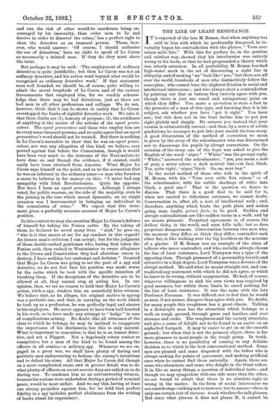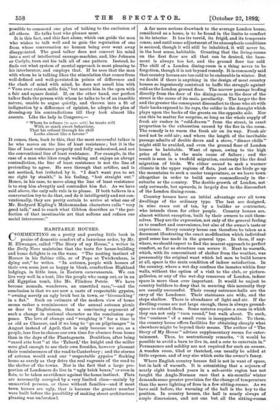THE LINE OF LEAST RESISTANCE.
TT is reported of the late M. Renan, that when anything was said to him with which he profoundly disagreed, he in- variably began his contradiction with the phrase, " Vous avez raison mule foie." With this for preface he, in the gentlest and subtlest way, showed that his interlocutor was entirely wrong in his facts, or that he had propounded a theory which was utterly mistaken. In all probability, M. Renan touched high-water mark in the art of discovering a right line in obliquity, and of making " no " look like " yes ;" but there are, all over the world, hundreds of men who instinctively follow the same plan ; who cannot bear the slightest friction in social and intellectual intercourse ; and who always start a contradiction by pointing out that at bottom they entirely agree with you, though there is just one small and unimportant point on which they differ. You make a quotation or state a fact in the presence of a man of this type, and knowing that it is his subject, ask whether you have "got it right." You have not ; but this does not in the least incline him to put you right plainly and simply. He assures you instead that your version is substantially correct ; and then, by a series of subtle gradations, he manages to put into your mouth the true story. A good illustration of the method of correction we mean is given by the story of the schoolmaster who was determined not to discourage his pupils by abrupt corrections. On the occasion of the story, one of the boys was asked to give the English of the word " niger." "White," was the prompt reply. "White," answered the schoolmaster ; "yes, you mean a sort of grey, a misty colour, a dark neutral tint,—in fact, black. Yes, quite right ; niger,' black. Go on, next boy."
Is the social method of those who talk in the spirit of M. Renan, with his " Vous avez mille fois raison," or of the schoolmaster, with his subtle shadings of white into black, a good one ? That is the question we desire to discuss. That there is a good deal to be said for it, when not carried to ridiculous extremes, we cannot doubt. Conversation is, after all, a sort of intellectual walk ; and, therefore, anything which beats the path plain and makes going easy, ought, prima facie, to be good. Sudden and abrupt contradictions are like sudden turns in a walk, and by no means pleasant. Perpetual agreement is, of course, the dullest thing in the world, and soon kills talk ; but so does perpetual disagreement. Conversation between two men who, the moment they differ, or think they differ, contradict each other fiat, is like walking over the big boulders on the moraine of a glacier. If M. Renan was an example of the class of talkers who never contradict, and who, socially, always choose the line of least resistance, Lord Tennyson was a type of the opposing class. Though possessed of a personality lovable and attractive in a high degree, Lord Tennyson was a devotee of the abrupt method. He said what he meant straight out, and con- tradicted any statement with which he did not agree, or which he knew to be wrong, without compunction. He had, of course, whatever willingness to sink his own views was required by good manners, but within those limits he cared nothing for the line of least resistance. It was the same with the late Professor Freeman. It was difficult not to feel that he would as soon, if not sooner, disagree than agree with you. No doubt, for many people this roughness has a great charm. Talking to a downright man has the attraction which belongs to a walk on rough ground, through gorse and heather, and over streams and rocks. The roughness and the variety stimulate, and give a sense of delight not to be found in an amble on an asphalted footpath. It may be easier to get on on the smooth ground ; but when that is not the primary object, there is far more pleasure to most"people in the rough going. In truth, however, there is no possibility of coming to any definite decision as to which is the best conversational method. Some men are pleased and some disgusted with the talker who is always seeking for points of agreement, and making artificial ones when he cannot find them naturally. Again, there are some who abominate and some who delight in the blunt talker. It is, like so many things, a question of individual taste ; and though we may sympathise with one side more than the other, we are bound to admit that there is no absolute right or wrong in the matter. In the form of social intercourse we are considering—talking not to instruct, but to amuse—there is only one certain test of success: to ask whether the talk pleases. But since what pleases A does not please B, it cannot be possible to commend one plan of talking to the exclusion of all others. He talks best who pleases most.
It is this fact, and this fact alone, which can guide the man who wishes to talk well and to gain the reputation of one from whose conversation no human being ever went away disappointed. The good talker does not convert his mind into a sort of intellectual sausage-machine, and, like Johnson or Carlyle, turn out his talk all of one pattern. Instead, he finds out what system of mental approach is most pleasing to his interlocutor, and employs that. If he sees that the man with whom he is talking likes the stimulation that comes from well-defined and well-persisted-in points of difference and the clash of mind with mind, he does not assail him with " Vous avez raison mille foie," but meets him in the open with a fair and square denial. If, on the other hand, our perfect talker finds the person with whom he talks to be of an irascible nature, unable to argue quietly, and thrown into a fit of indignation by a difference of opinion, he adopts the plan of dressing-up his contradictions till they look almost like assents. Like the lady in Congreve,—
" Whom he refuses [to agree with] he treats still
With so much sweet behaviour, That his refusal through his skill Looks almost like a favour."
It comes, then, back to this, that the most successful talker is he who moves on the line of least resistance ; but it is the line of least resistance properly and fully understood, and not
the conventional line of least resistance. For example, in the case of a man who likes rough walking and enjoys an abrupt contradiction, the line of least resistance is not the line of pretending to agree. He sees through that artifice, and is not soothed, but irritated by it. "I don't want you to set me right by stealth," is his feeling, "but straight out."
Hence, in his case, to move along the line of least resistance is to stop him abruptly and contradict him flat. As we have said above, the only safe rule is to please. If both talkers in a conversation try to do that, and do it intelligently and not con- ventionally, they are pretty certain to arrive at what one of Mr. Rudyard Kipling's Mahommedan characters calls "very good talk," and to reach what Gibbon describes as "the per- fection of that inestimable art that softens and refines our social intercourse."







































 Previous page
Previous page